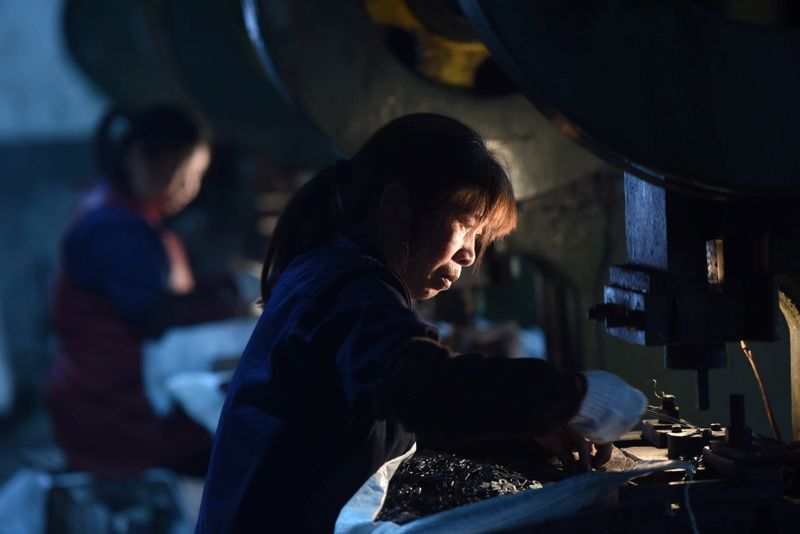BEIJING (Reuters) - China's factory activity expanded at a stronger pace in June, as the economy continues to recover after the government lifted strict lockdowns and ramped up investment, but export orders remained weak as the global coronavirus crisis shatters demand.
The official manufacturing Purchasing Manager's Index (PMI) came in at 50.9 in June, compared with May's 50.6, National Bureau of Statistics (NBS) data showed on Tuesday, and was above the 50.4 forecast in a Reuters poll of analysts.
The 50-point mark separates expansion from contraction on a monthly basis.
The uptick was underpinned by the quickening pace of expansion in production, which grew to 53.9 in June from 53.2 the previous month.
The forward-looking total new orders gauge also brightened, rising to 51.4 from May's 50.9, suggesting domestic demand is picking up as industries from non-ferrous metals to general equipment and electrical machinery all showed an improvement.
But export orders continued to contract, albeit at a slower pace, with a sub-index standing at 42.6 compared to 35.3 in May, well below the 50-point mark.
"Although the PMI index picked up this month and the manufacturing sector recovered steadily, it is also important to see that uncertainty remains," NBS official Zhao Qinghe said in a statement accompanying the data.
DOWNWARD PRESSURE
High frequency Chinese data tracked by Nomura showed a flurry of better-than-expected indicators recently, including power production, property and auto sales, prompting the brokerage to raise its GDP growth forecast for the second quarter to 2.6% from 1.2%.
While higher spending, particularly in infrastructure, was expected to boost economic activity for the rest of this year, some analysts have warned against being overly optimistic about the outlook given uncertainties around the COVID-19 pandemic.
Export demand has remained weak with infections steadily rising across the world. Some fear a worldwide recession might turn out to be more pronounced than expected in the event a second wave of coronavirus cases force many countries to reimpose strict lockdowns.
Adding to the worries domestically is a cluster found earlier this month, which has steadily grown to more than 200 cases associated with a food market emerged in Beijing, underscoring the ever present economic threat posed by the virus.
Beijing has announced a range of measures to bolster the economy and support jobs, but the global downturn has meant activity remains patchy in most sectors.
Despite stronger demand, factories reduced headcount for the second time in June since they reopened, with a sub-index falling to 49.1 from 49.4 in May, the survey showed.
A separate official survey on China's services sector showed activity expanded at a faster clip in June. The non-manufacturing Purchasing Managers' Index rose to 54.4, from 53.6 in May, suggesting steadily stabilising business confidence.

Still, a sub-index for construction activity, a key driver of growth, fell to 59.8 from 60.8 the previous month, the survey showed, highlighting the uneven nature of the recovery.